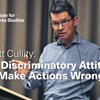permissible

Garrett Cullity: How Discriminatory Attitudes Can Make Actions Wrong
Research seminar with Garrett Cullity, professor of philosophy at the Australian National University, known for his research on moral philosophy. Abstract In general, otherwise permissible actions do

Garrett Cullity: How Discriminatory Attitudes Can Make Actions Wrong
Research seminar with Garrett Cullity, professor of philosophy at the Australian National University, known for his research on moral philosophy. Abstract In general, otherwise permissible actions do
Garrett Cullity: But Thinking Makes It So: How Discriminatory Attitudes Can Make Actions Wrong
Research seminar with Garrett Cullity, professor of philosophy at the Australian National University, known for his research on moral philosophy. Venue: Holländargatan 13, Stockholm Register here > Ab
Katie Steele: The real paradox of supererogation
Katie Steele, Associate Professor, Australian National University. Abstract It is a feature of our ordinary moral talk that some acts are supererogatory, or beyond what is required. But ‘beyond’ in what
Review of Elizabeth Barnes, The Minority Body: Theory of Disability
Oxford: Oxford University Press, 2016, pp. 224, £25. Ratio. doi:10.1111/rati.12151 What does being disabled mean for the disabled individual’s life? Does being a disabled individual have inherent negatregarding disability.
Asymmetry and Non-Identity
Utilitas, Volume 31, Issue 3, pp.213-230. doi.org/10.1017/S0953820818000341 Abstract In this article we distinguish two versions of the non-identity problem: one involving positive well-being and one inv

Creating happy animals in order to eat them: Jeff McMahan and Tim Campbell
In recent debates about the ethics of eating animals, some have advanced the claim that if people cause animals to exist and give them good lives in order to be able to eat them, then even if the anim
Laura Valentini: There Are No Natural Rights: Rights, Duties and Positive Norms
Laura Valentini, Associate Professor of Political Science at London School of Economics ABSTRACTMany contemporary philosophers—of a broadly deontological disposition—believe that there exist some pre-i. In this paper, I defend this unpopular view. I argue that all rights are grounded in —namely, norms constituted by the collective acceptance of gives “oughts”—, provided the norms’ content meets some independent standards of moral acceptability. This view, I suggest, does justice to the relational nature of rights, by explaining how it is that right-holders acquire the authority to demand certain actions (or omissions) from duty-bearers. Furthermore, the view does not divest human beings of fundamental moral protections. Even if, absent some rights-grounding positive norms, obligations cannot be to others, we still have (non-directed) placing constraints on how we may permissibly treat one Another.
Nondeterminacy, Two-Step Models, and Justified Choice
Ethics, Volume 129, no. 2, pp. 284-308. doi.org/10.1086/700032 Abstract This article analyzes approaches to nondeterminacy (e.g., incommensurability, indeterminacy, parity) that suggest that one can make
Why Wear Blinders? Boonin and the Narrow Approach to the Non-identity Problem
Law, Ethics and Philosophy vol. 7, 102-126 Abstract Boonin endorses reasoning that leads to what he calls the Implausible Conclusion regarding when future-directed choices that at first glance seem to i








